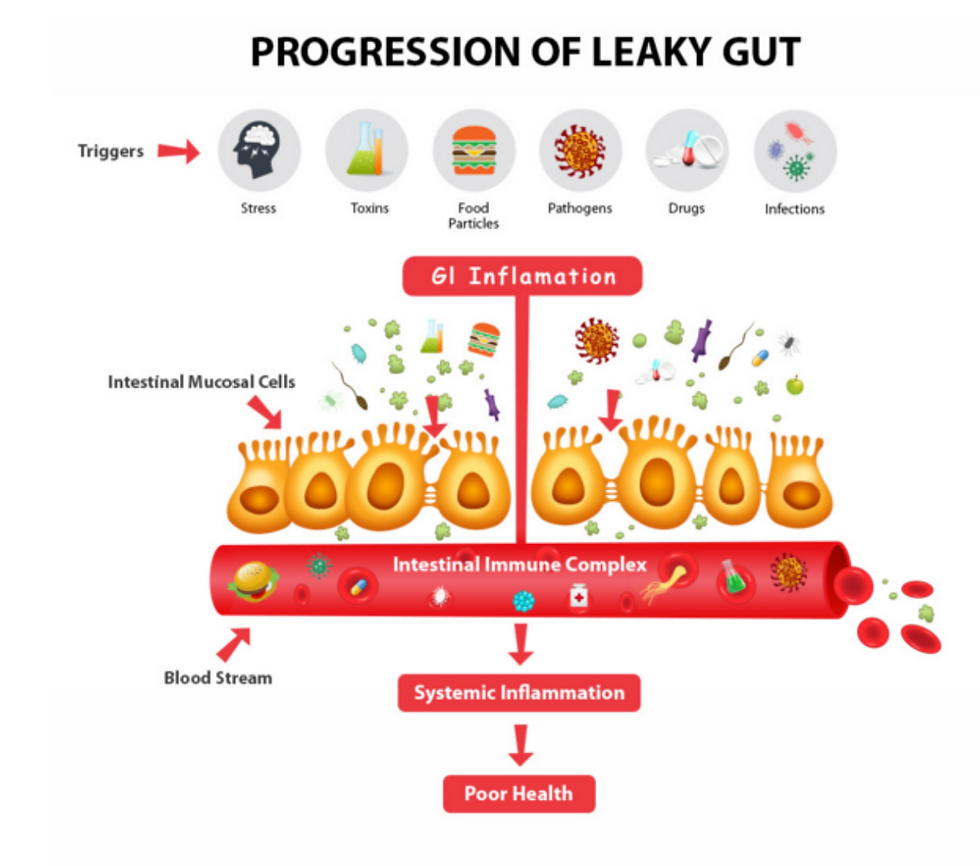Digestive Dysfunction and the 'Four R' Gut Healing Program
- ella40105
- Feb 3, 2021
- 3 min read
Updated: May 10, 2021

Sadly, over 85 percent of all adult Americans suffer from some form of intestinal problem. Suffering from these conditions causes a myriad of bodily harms, encompassing every cell and organ in the human body as the gut is key to the immune system’s response. Nutrient deficiencies, pollution, poor diet, dehydration, stress, poor sleeping habits, inflammation, lack of exercise, and certain medications like antacids, antibiotics, and narcotics are among the long list of contributors to poor digestive health. Fortunately, the vast majority of these conditions are entirely preventable and often times easily remedied.
The three most common digestive dysfunctions that we see include Irritable Bowel Syndrome (IBS), Leaky Gut and Small Intestinal Bacterial Overgrowth (SIBO).
Irritable Bowel Syndrome (IBS) is a condition in which the colon muscle contracts more easily than in people without the condition. A number of factors can trigger IBS, including certain types of food, certain supplements or medications, and stress. Symptoms of IBS can include abdominal pain, cramps, bloating, excessive gas, and a change in bowel habits such as dramatic shifts away from normal stool. People with IBS commonly experience alternating constipation and diarrhea.
Leaky Gut is a condition in which microbes, waste or other toxins ‘leak’ through an inflamed and permeable gut wall, resulting in these toxins moving into the blood stream and other internal areas of the body where they are not supposed to be. This can cause a myriad of problems and ignite an immune response. The ignited immune system may overreact causing increased food sensitivities, autoimmune disease, or further damage other organs. The weakening of the gut wall itself may be caused by toxins, poor diet, parasites, infection, medications, and much more. Once your body’s intestinal lining is damaged, it is less able to protect your body’s internal environment, and your ability to filter needed nutrients and other biological substances into your system appropriately will be compromised.
Conditions related to Leaky Gut include:
Autoimmune disease like inflammatory bowel disease and hashimotos thyroiditis
Headaches
Irritable Bowel Syndrome (IBS)
Skin conditions like eczema and psoriasis
Food allergies
Chronic indigestion
Small Intestinal Bacterial Overgrowth (SIBO) is a condition in which bacteria in the small intestine has overgrown and become chronic. In most patients, SIBO is not caused by a single type of bacteria, but is an overgrowth of the various types of bacteria that should normally be found in the colon. Bacteria are normally present throughout the entire gastrointestinal tract, but in varied amounts. Relatively few bacteria normally live in the small intestine compared to the large intestine.
SIBO has been shown to negatively affect both the structure and function of the small intestine. It may significantly interfere with digestion of food and absorption of nutrients leading to serious malnutrition, primarily by damaging the cells lining the small bowel. This damage to the small intestinal cells can lead to leaky gut, which can lead to a whole host of problems from inflammation to autoimmune disease to food allergies. It is currently believed that a small bowel bacterial outgrowth is one of the most misdiagnosed and under diagnosed conditions today.
The ‘Four R’ Gut Healing Program
At Undercurrent Wellness we use the ‘Four R’ gut healing program to help people recover from digestive dysfunction as described above.
Step One: Remove the problem(s). In this step we remove the offending foods, pathogens, and toxins contributing to poor gut health. All of these irritate the gut in some form and create an inflammatory response. This means caffeine, alcohol, processed foods, sugars, gluten and dairy, and in some cases grain and bean as well. In this step we also want to remove any pathogenic bacteria or infections that have come to light through testing. We may use herbal antimicrobials depending on your specific findings.
Step Two: Replace what you are missing to ensure proper digestion and absorption of nutrients. In this step we want to replace any digestive aids that you may be lacking. Digestive enzymes and stomach acid are the most common. Including these when indicated will better help you utilize the nutrients that you are taking in through food.
Step Three: Reinoculate with beneficial bacteria (i.e. Probiotics). Restoring beneficial bacteria to reestablish a healthy balance of good bacteria in your gut is critical for health and immune function. We typically recommend anywhere from 10 -100 billion units a day. Also, taking a prebiotic (food for the good bacteria) or consuming foods high soluble fiber is important.
Step Four: Repair the gut lining. Providing the nutrients necessary to help the gut repair itself is essential. We use nutrients like L-Glutamine, omega 3‘s, zinc, aloe vera, curcumin and slippery elm to help repair and rebuild the gut lining.




Comments